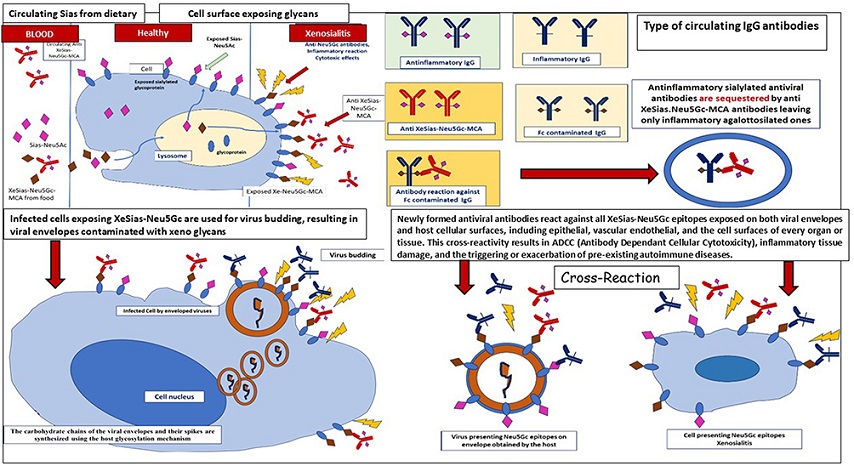Nikhil Prasad Fact checked by:Thailand Medical News Team Nov 08, 2024 1 year, 3 months, 2 weeks, 2 days, 18 hours, 49 minutes ago
Medical News: Research by Fiorella Carnevali from the ENEA Research Centre in Rome and Sara Mangiaterra and Giacomo Rossi from the University of Camerino, Italy, explores a fascinating but complex topic - xenosialylation. This unique process may help us understand the immune system’s responses to both infections and vaccinations. Xenosialylation, or the integration of non-human sialic acid, specifically Neu5Gc, into human cells, can have wide-ranging impacts. When humans ingest certain animal products, Neu5Gc can enter the bloodstream, become integrated into cell surfaces, and potentially trigger immune responses. This
Medical News report explores how Neu5Gc may be linked to complications after infections and vaccinations, especially concerning COVID-19.
 Graphical Abstract - Xenosialylation Linked to COVID-19 Infection and Vaccine Complications
How Neu5Gc Triggers Immune Responses
Graphical Abstract - Xenosialylation Linked to COVID-19 Infection and Vaccine Complications
How Neu5Gc Triggers Immune Responses
In most mammals, Neu5Gc is a common component, unlike in humans, who lack the enzyme needed to produce it. However, when humans consume Neu5Gc-containing products (like red meat or dairy), they can inadvertently incorporate it into their cells. Once embedded in human tissues, Neu5Gc can be recognized as foreign by the immune system, setting off a reaction known as xenosialitis.
The study suggests that this process may play a role in inflammatory responses and autoimmunity. According to the research, Neu5Gc could lead to the production of antibodies that target these “foreign” components, causing chronic inflammation and contributing to autoimmune conditions.
Post-Infection and Post-Vaccination Complications
The researchers propose that xenosialylation might partly explain why certain people experience severe complications after infections or vaccinations. For instance, when the immune system responds to a virus, such as SARS-CoV-2, it produces antibodies to fight the infection. In individuals with Neu5Gc incorporated into their tissues, these antibodies may mistakenly target Neu5Gc-containing structures in the body, amplifying the immune response and potentially causing additional harm.
The Role of Xenosialylation in COVID-19
The COVID-19 pandemic highlighted how certain people experience severe reactions, while others do not. Carnevali and colleagues suggest that individuals with higher Neu5Gc levels may be at greater risk of inflammatory reactions, including cytokine storms, as their immune systems misidentify these Neu5Gc structures as threats. This heightened immune reaction could contribute to coagulopathy and organ damage seen in severe COVID-19 cases.
In vaccinated individuals, xenosialylation might similarly influence the immune response, sometimes resulting in adverse reactions. The hypothesis suggests that when these vaccinated individuals with high Neu5Gc exposure produce neutralizing antibodies against the virus, these antibodies might attack Neu5Gc structures in their own tissues.
Key Findings of the Study
The resea
rchers identify several key mechanisms by which xenosialylation might influence health outcomes after infections or vaccinations:
-Antibody Cross-Reactivity: When antibodies developed in response to infections or vaccines cross-react with Neu5Gc-containing structures, it can lead to inflammation, tissue damage, and worsening of autoimmune conditions.
-Autoantibody Production: Anti-Neu5Gc antibodies produced in response to xenosialylation may act as autoimmune antibodies, targeting the host's own cells.
Imbalanced Antibody Profile: When anti-inflammatory antibodies are removed due to cross-reactivity with Neu5Gc, the balance shifts towards pro-inflammatory antibodies, contributing to inflammatory diseases.
-Gender and Hormonal Differences: This study notes that Neu5Gc exposure may lead to different immune responses between men and women, with women potentially experiencing more autoimmune reactions post-infection or post-vaccination.
-Implications for Autoimmune Diseases: Neu5Gc exposure may also predispose individuals to autoimmune diseases like rheumatoid arthritis, multiple sclerosis, and type 1 diabetes, as the immune system targets tissues containing Neu5Gc.
Testing the Hypothesis: Future Directions
To verify the hypothesis, the authors propose testing stored biological samples from COVID-19 patients to assess the levels of anti-Neu5Gc antibodies. If high anti-Neu5Gc levels correlate with severe symptoms or adverse reactions, this could provide strong support for the hypothesis. Additionally, analyzing the glycosylation status of circulating antibodies could help distinguish between pro-inflammatory and anti-inflammatory responses, offering insight into disease severity.
Implications and Conclusions
The findings suggest that understanding xenosialylation could lead to more personalized approaches in healthcare. By identifying individuals at higher risk of severe inflammatory responses, doctors could better manage complications related to infections and vaccinations. For instance, dietary adjustments or lifestyle modifications might help reduce Neu5Gc levels in individuals prone to autoimmunity, lowering their risk of adverse reactions.
This research highlights the complexity of the human immune system and the potential for diet and environmental exposure to influence health outcomes. As we continue to learn more about Neu5Gc and its effects, we may uncover new strategies for preventing or managing autoimmune conditions and inflammatory responses.
The study findings were published in the peer-reviewed journal: Journal of Inflammation Research.
https://www.tandfonline.com/doi/full/10.2147/JIR.S471093
For the latest COVID-19 News, keep on logging to Thailand
Medical News.
Read Also:
https://www.thailandmedical.news/news/rbd-of-sars-cov-2-omicron-sub-lineages-targets-siglec-9-to-decrease-its-immunogenicity-by-preventing-macrophage-phagocytosis
https://www.thailandmedical.news/news/amp-kinase-as-a-new-hope-for-tackling-long-term-covid-19-complications
